高考英语词汇重点详解:arrange的用法
- 格式:docx
- 大小:12.36 KB
- 文档页数:2
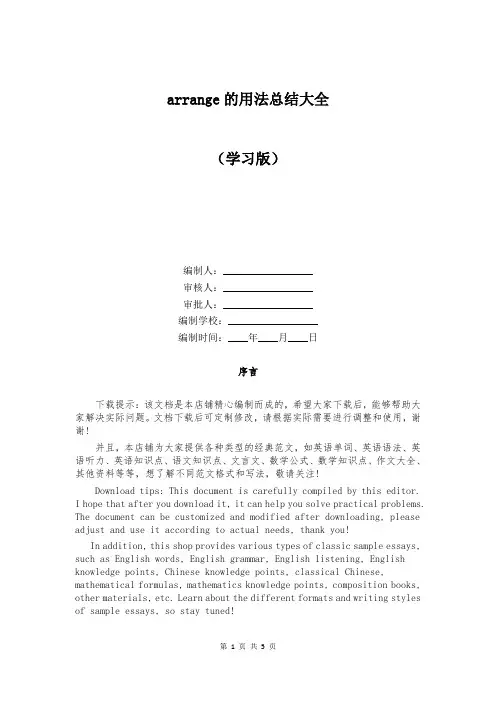
arrange的用法总结大全(学习版)编制人:__________________审核人:__________________审批人:__________________编制学校:__________________编制时间:____年____月____日序言下载提示:该文档是本店铺精心编制而成的,希望大家下载后,能够帮助大家解决实际问题。
文档下载后可定制修改,请根据实际需要进行调整和使用,谢谢!并且,本店铺为大家提供各种类型的经典范文,如英语单词、英语语法、英语听力、英语知识点、语文知识点、文言文、数学公式、数学知识点、作文大全、其他资料等等,想了解不同范文格式和写法,敬请关注!Download tips: This document is carefully compiled by this editor.I hope that after you download it, it can help you solve practical problems. The document can be customized and modified after downloading, please adjust and use it according to actual needs, thank you!In addition, this shop provides various types of classic sample essays, such as English words, English grammar, English listening, English knowledge points, Chinese knowledge points, classical Chinese, mathematical formulas, mathematics knowledge points, composition books, other materials, etc. Learn about the different formats and writing styles of sample essays, so stay tuned!arrange的用法总结大全arrange的意思arrange的简明意思vt. 整理;安排;计划;改编(乐曲)vi. 协商;计划英式发音 [ə'reɪndʒ] 美式发音 [ə'reɪndʒ]arrange的词态变化为:名词: arranger 过去式: arranged 过去分词: arranged 现在分词: arranging 第三人称单数: arranges arrange的详细意思在英语中,arrange不仅具有上述意思,还有更详尽的用法,arrange作动词 v. 时具有整理;布置;筹备,(作)安排,(作)准备,预备,计划;【音】改编(乐曲);整顿;设法;商定,洽商,商妥,协商;调停(纠纷),调解;谱写(乐曲);排列;分类,把…分等级,把…归入一类;达成(协议)等意思,arrange的具体用法用作动词 v.arrange的基本意思是指把许多人或事物安排在相对适当的位置上或对构成其事物的诸多个体进行有秩序地排列,也指按期望的目标对事物进行精心的安排处理。
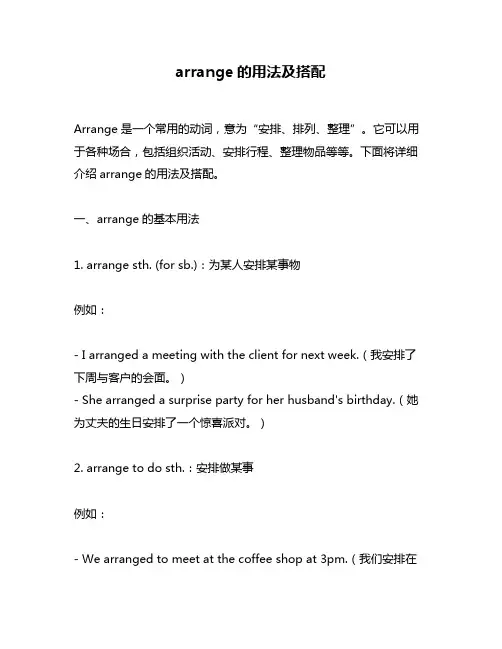
arrange的用法及搭配Arrange是一个常用的动词,意为“安排、排列、整理”。
它可以用于各种场合,包括组织活动、安排行程、整理物品等等。
下面将详细介绍arrange的用法及搭配。
一、arrange的基本用法1. arrange sth. (for sb.):为某人安排某事物例如:- I arranged a meeting with the client for next week.(我安排了下周与客户的会面。
)- She arranged a surprise party for her husband's birthday.(她为丈夫的生日安排了一个惊喜派对。
)2. arrange to do sth.:安排做某事例如:- We arranged to meet at the coffee shop at 3pm.(我们安排在下午3点在咖啡店见面。
)- I have arranged to take the day off work tomorrow.(我已经安排好明天请一天假。
)3. arrange for sb. to do sth.:安排某人做某事例如:- I have arranged for a plumber to come and fix the leak.(我已经安排了一个管道工来修理漏水。
)- The school arranged for the students to visit the museum.(学校安排学生参观博物馆。
)二、arrange的常见搭配1. arrange a meeting/appointment:安排会议/约会例如:- Can you arrange a meeting with the CEO for me?(你能为我安排一次与CEO的会议吗?)- I need to arrange an appointment with my doctor.(我需要安排一次与我的医生的约会。
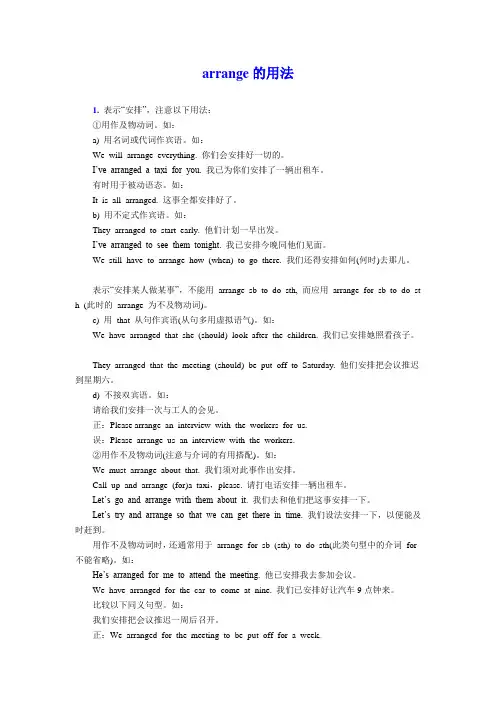
arrange的用法1.表示“安排”,注意以下用法:①用作及物动词。
如:a) 用名词或代词作宾语。
如:We will arrange everything. 你们会安排好一切的。
I’ve arranged a taxi for you. 我已为你们安排了一辆出租车。
有时用于被动语态。
如:It is all arranged. 这事全都安排好了。
b) 用不定式作宾语。
如:They arranged to start early. 他们计划一早出发。
I’ve arranged to see them tonight. 我已安排今晚同他们见面。
We still have to arrange how (when) to go there. 我们还得安排如何(何时)去那儿。
表示“安排某人做某事”,不能用arrange sb to do sth, 而应用arrange for sb to do st h (此时的arrange 为不及物动词)。
c) 用that 从句作宾语(从句多用虚拟语气)。
如:We have arranged that she (should) look after the children. 我们已安排她照看孩子。
They arranged that the meeting (should) be put off to Saturday. 他们安排把会议推迟到星期六。
d) 不接双宾语。
如:请给我们安排一次与工人的会见。
正:Please arrange an interview with the workers for us.误:Please arrange us an interview with the workers.②用作不及物动词(注意与介词的有用搭配)。
如:We must arrange about that. 我们须对此事作出安排。
Call up and arrange (for)a taxi,please. 请打电话安排一辆出租车。
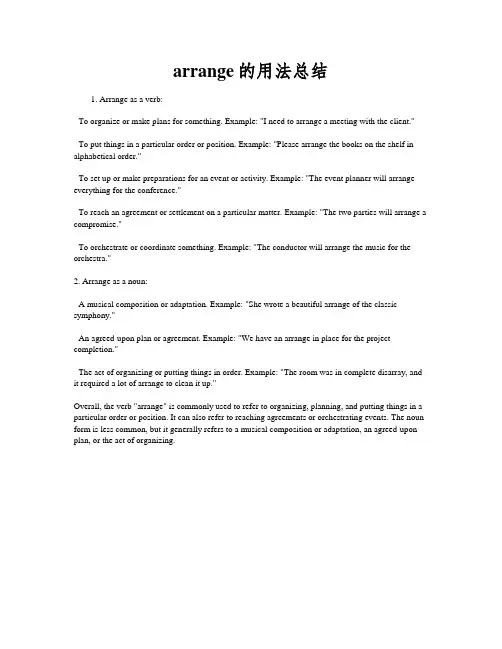
arrange的用法总结1. Arrange as a verb:- To organize or make plans for something. Example: "I need to arrange a meeting with the client."- To put things in a particular order or position. Example: "Please arrange the books on the shelf in alphabetical order."- To set up or make preparations for an event or activity. Example: "The event planner will arrange everything for the conference."- To reach an agreement or settlement on a particular matter. Example: "The two parties will arrange a compromise."- To orchestrate or coordinate something. Example: "The conductor will arrange the music for the orchestra."2. Arrange as a noun:- A musical composition or adaptation. Example: "She wrote a beautiful arrange of the classic symphony."- An agreed-upon plan or agreement. Example: "We have an arrange in place for the project completion."- The act of organizing or putting things in order. Example: "The room was in complete disarray, and it required a lot of arrange to clean it up."Overall, the verb "arrange" is commonly used to refer to organizing, planning, and putting things in a particular order or position. It can also refer to reaching agreements or orchestrating events. The noun form is less common, but it generally refers to a musical composition or adaptation, an agreed-upon plan, or the act of organizing.。
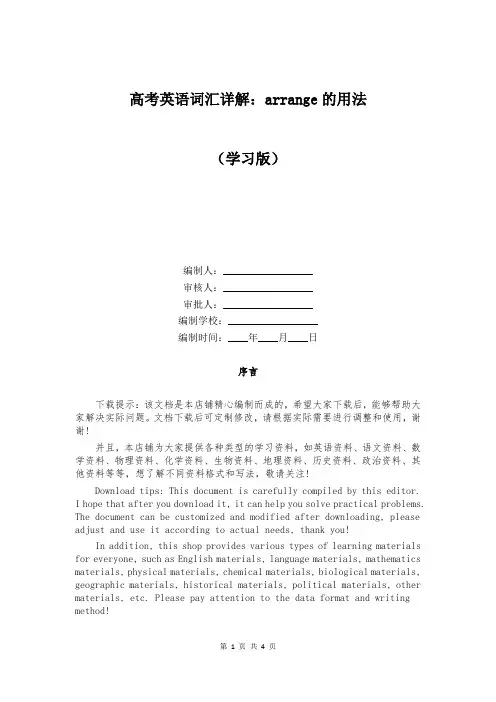
高考英语词汇详解:arrange的用法(学习版)编制人:__________________审核人:__________________审批人:__________________编制学校:__________________编制时间:____年____月____日序言下载提示:该文档是本店铺精心编制而成的,希望大家下载后,能够帮助大家解决实际问题。
文档下载后可定制修改,请根据实际需要进行调整和使用,谢谢!并且,本店铺为大家提供各种类型的学习资料,如英语资料、语文资料、数学资料、物理资料、化学资料、生物资料、地理资料、历史资料、政治资料、其他资料等等,想了解不同资料格式和写法,敬请关注!Download tips: This document is carefully compiled by this editor.I hope that after you download it, it can help you solve practical problems. The document can be customized and modified after downloading, please adjust and use it according to actual needs, thank you!In addition, this shop provides various types of learning materials for everyone, such as English materials, language materials, mathematics materials, physical materials, chemical materials, biological materials, geographic materials, historical materials, political materials, other materials, etc. Please pay attention to the data format and writing method!高考英语词汇详解:arrange的用法--> 高考英语词汇详解:arrange的用法1. 表示“安排”,注意以下用法:①用作及物动词。
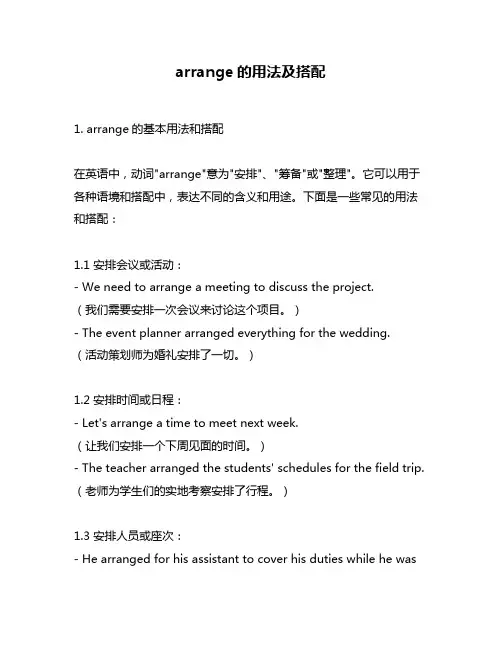
arrange的用法及搭配1. arrange的基本用法和搭配在英语中,动词"arrange"意为"安排"、"筹备"或"整理"。
它可以用于各种语境和搭配中,表达不同的含义和用途。
下面是一些常见的用法和搭配:1.1 安排会议或活动:- We need to arrange a meeting to discuss the project.(我们需要安排一次会议来讨论这个项目。
)- The event planner arranged everything for the wedding.(活动策划师为婚礼安排了一切。
)1.2 安排时间或日程:- Let's arrange a time to meet next week.(让我们安排一个下周见面的时间。
)- The teacher arranged the students' schedules for the field trip. (老师为学生们的实地考察安排了行程。
)1.3 安排人员或座次:- He arranged for his assistant to cover his duties while he wasaway.(他安排助手在他离开期间代替他的职责。
)- The hostess carefully arranged the guests at the dinner party. (女主人精心地为晚宴上的客人安排座位。
)1.4 整理或摆放物品:- She arranged the flowers in a vase on the table.(她在桌子上的花瓶里整理了花。
)- I need to arrange my books in alphabetical order on the shelf. (我需要按字母顺序在书架上整理我的书。
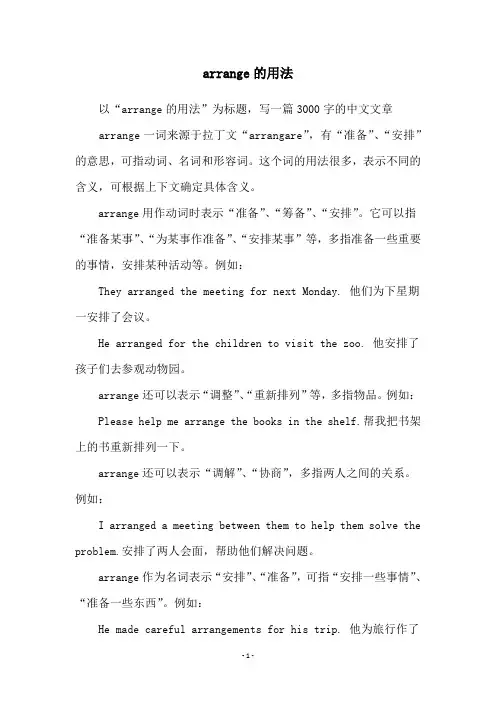
arrange的用法以“arrange的用法”为标题,写一篇3000字的中文文章arrange一词来源于拉丁文“arrangare”,有“准备”、“安排”的意思,可指动词、名词和形容词。
这个词的用法很多,表示不同的含义,可根据上下文确定具体含义。
arrange用作动词时表示“准备”、“筹备”、“安排”。
它可以指“准备某事”、“为某事作准备”、“安排某事”等,多指准备一些重要的事情,安排某种活动等。
例如:They arranged the meeting for next Monday. 他们为下星期一安排了会议。
He arranged for the children to visit the zoo. 他安排了孩子们去参观动物园。
arrange还可以表示“调整”、“重新排列”等,多指物品。
例如: Please help me arrange the books in the shelf.帮我把书架上的书重新排列一下。
arrange还可以表示“调解”、“协商”,多指两人之间的关系。
例如:I arranged a meeting between them to help them solve the problem.安排了两人会面,帮助他们解决问题。
arrange作为名词表示“安排”、“准备”,可指“安排一些事情”、“准备一些东西”。
例如:He made careful arrangements for his trip. 他为旅行作了精心的安排。
arrange还可以用作形容词,表示“有组织的”、“有安排的”。
例如:I attended an arranged lecture.参加了一场有组织的讲座。
以上就是arrange的用法,它的含义可根据上下文确定。
arrange 用作动词表示“准备”、“安排”、“调整”等;作为名词表示“安排”、“准备”;用作形容词表示“有组织的”、“有安排的”。
arrange是一个灵活多变的词,它可以用在一些各种不同的情景中,因此在学习该词时可以多去掌握它的上下文。
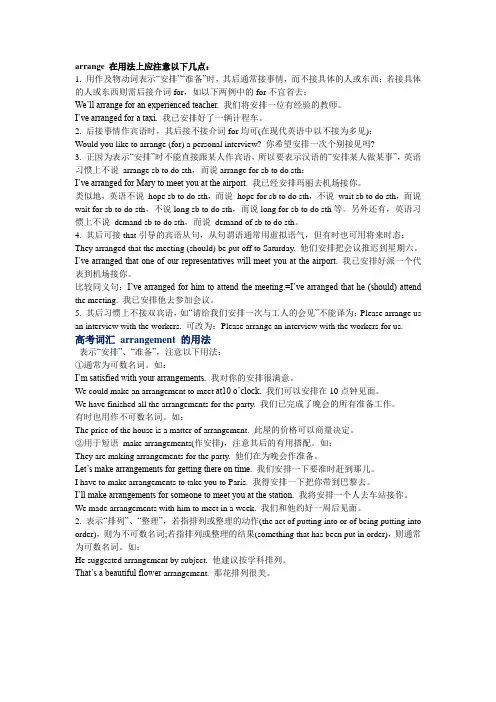
arrange 在用法上应注意以下几点:1. 用作及物动词表示“安排”“准备”时,其后通常接事情,而不接具体的人或东西;若接具体的人或东西则需后接介词for,如以下两例中的for不宜省去:We’ll arrange for an experienced teacher. 我们将安排一位有经验的教师。
I’ve arranged for a taxi. 我已安排好了一辆计程车。
2. 后接事情作宾语时,其后接不接介词for均可(在现代英语中以不接为多见):Would you like to arrange (for) a personal interview? 你希望安排一次个别接见吗?3. 正因为表示“安排”时不能直接跟某人作宾语,所以要表示汉语的“安排某人做某事”,英语习惯上不说arrange sb to do sth,而说arrange for sb to do sth:I’ve arranged for Mary to meet you at the airport. 我已经安排玛丽去机场接你。
类似地,英语不说hope sb to do sth,而说hope for sb to do sth,不说wait sb to do sth,而说wait for sb to do sth,不说long sb to do sth,而说long for sb to do sth等。
另外还有,英语习惯上不说demand sb to do sth,而说demand of sb to do sth。
4. 其后可接that引导的宾语从句,从句谓语通常用虚拟语气,但有时也可用将来时态:They arranged that the meeting (should) be put off to Saturday. 他们安排把会议推迟到星期六。
I’ve arranged that one of our representatives will meet you at the airport. 我已安排好派一个代表到机场接你。
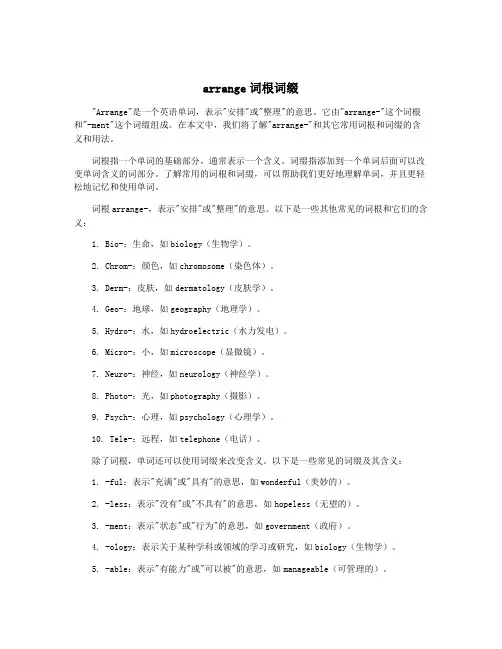
arrange词根词缀"Arrange"是一个英语单词,表示"安排"或"整理"的意思。
它由"arrange-"这个词根和"-ment"这个词缀组成。
在本文中,我们将了解"arrange-"和其它常用词根和词缀的含义和用法。
词根指一个单词的基础部分,通常表示一个含义。
词缀指添加到一个单词后面可以改变单词含义的词部分。
了解常用的词根和词缀,可以帮助我们更好地理解单词,并且更轻松地记忆和使用单词。
词根arrange-,表示"安排"或"整理"的意思。
以下是一些其他常见的词根和它们的含义:1. Bio-:生命,如biology(生物学)。
2. Chrom-:颜色,如chromosome(染色体)。
3. Derm-:皮肤,如dermatology(皮肤学)。
4. Geo-:地球,如geography(地理学)。
5. Hydro-:水,如hydroelectric(水力发电)。
6. Micro-:小,如microscope(显微镜)。
7. Neuro-:神经,如neurology(神经学)。
8. Photo-:光,如photography(摄影)。
9. Psych-:心理,如psychology(心理学)。
10. Tele-:远程,如telephone(电话)。
除了词根,单词还可以使用词缀来改变含义。
以下是一些常见的词缀及其含义:1. -ful:表示"充满"或"具有"的意思,如wonderful(美妙的)。
2. -less:表示"没有"或"不具有"的意思,如hopeless(无望的)。
3. -ment:表示"状态"或"行为"的意思,如government(政府)。
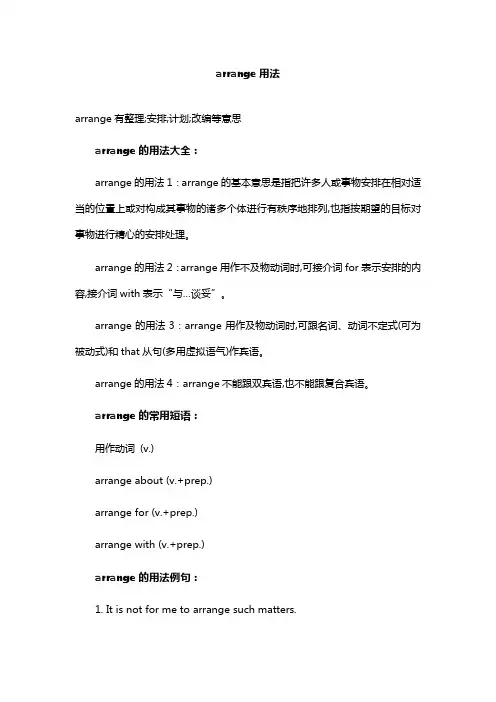
arrange用法arrange有整理;安排;计划;改编等意思arrange的用法大全:arrange的用法1:arrange的基本意思是指把许多人或事物安排在相对适当的位置上或对构成其事物的诸多个体进行有秩序地排列,也指按期望的目标对事物进行精心的安排处理。
arrange的用法2:arrange用作不及物动词时,可接介词for表示安排的内容,接介词with表示“与…谈妥”。
arrange的用法3:arrange用作及物动词时,可跟名词、动词不定式(可为被动式)和that从句(多用虚拟语气)作宾语。
arrange的用法4:arrange不能跟双宾语,也不能跟复合宾语。
arrange的常用短语:用作动词(v.)arrange about (v.+prep.)arrange for (v.+prep.)arrange with (v.+prep.)arrange的用法例句:1. It is not for me to arrange such matters.我无权安排这些事情。
2. Customers who arrange overdrafts will face a monthly charge of £5.透支的客户每月要缴纳5英镑的费用。
3. I will arrange for someone to take you round.我会安排人带你转转。
4. We can arrange unsecured loans for any amount from £500 to £7,500.我们能提供数额从500英镑到7,500英镑的无担保贷款。
5. He had managed to arrange to stay on in Adelaide.他已设法安排好在阿德莱德继续呆下去。
6. Arrange for the transfer of medical records to your new doctor.安排一下把病历转给你的新医生的事宜。
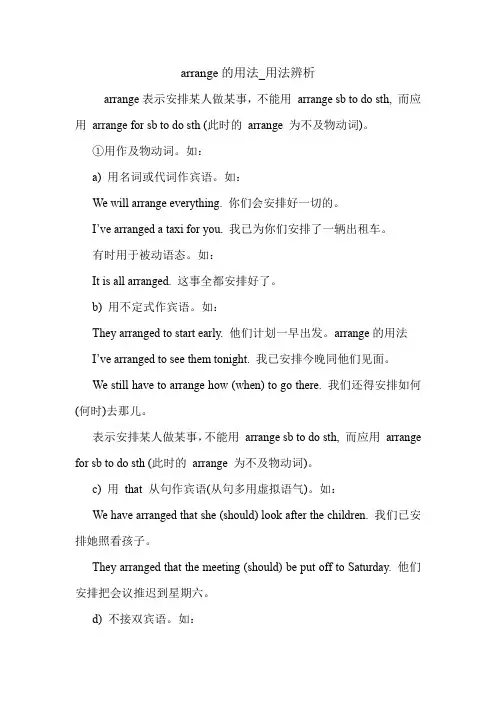
arrange的用法_用法辨析arrange表示安排某人做某事,不能用arrange sb to do sth, 而应用arrange for sb to do sth (此时的arrange 为不及物动词)。
①用作及物动词。
如:a) 用名词或代词作宾语。
如:We will arrange everything. 你们会安排好一切的。
I’ve arranged a taxi for you. 我已为你们安排了一辆出租车。
有时用于被动语态。
如:It is all arranged. 这事全都安排好了。
b) 用不定式作宾语。
如:They arranged to start early. 他们计划一早出发。
arrange的用法I’ve arranged to see them tonight. 我已安排今晚同他们见面。
We still have to arrange how (when) to go there. 我们还得安排如何(何时)去那儿。
表示安排某人做某事,不能用arrange sb to do sth, 而应用arrange for sb to do sth (此时的arrange 为不及物动词)。
c) 用that 从句作宾语(从句多用虚拟语气)。
如:We have arranged that she (should) look after the children. 我们已安排她照看孩子。
They arranged that the meeting (should) be put off to Saturday. 他们安排把会议推迟到星期六。
d) 不接双宾语。
如:请给我们安排一次与工人的会见。
正:Please arrange an interview with the workers for us.误:Please arrange us an interview with the workers.②用作不及物动词(注意与介词的有用搭配)。
arrange 的读法、释义和用法arrange的发音为英音[əˈreɪndʒ]或美音[əˈreɪndʒ]。
释义方面,arrange主要用作动词,意为“安排;筹划;整理;布置”。
它通常指将事物或人按照特定的顺序或方式进行组织或设置,以达到某种目的或效果。
在用法上,arrange既可以用作及物动词,也可以用作不及物动词。
作为及物动词时,它可以跟名词、代词、动词不定式(可带to,也可不带to)或that从句作宾语。
例如:“I'll arrange a meeting for you.”(我会为你安排一次会面。
)在这个例子中,arrange作为及物动词,后面跟了一个名词meeting作宾语。
作为不及物动词时,arrange通常与介词连用,如arrange for(为……安排)、arrange with(与……商定)等,以表达更具体的意义。
例如:“We arranged with the hotel for a room.”(我们与旅馆商定了一间房间。
)此外,arrange还有一些常用的固定搭配和短语,如arrange a date(安排日期)、arrange a party(安排聚会)等,这些短语在表达上具有特定的含义和用法。
在句子中,arrange的位置和时态可以根据需要进行变化,以适应不同的语境和表达需求。
例如,可以使用现在进行时表示正在安排的动作,如“I am arranging the flowers in the vase.”(我正在花瓶里插花。
)也可以使用过去式表示已经完成的安排,如“Theyarranged a surprise party for their friend.”(他们为朋友安排了一个惊喜聚会。
)总的来说,arrange是一个多功能的动词,可以根据不同的语境和需要灵活使用。
如需更多关于arrange的释义和用法,建议查阅英汉词典或咨询英语教师。
arrange的常用搭配作者:纪祝华来源:《新高考·高二英语》2012年第05期arrange既可用作及物动词又可用作不及物动词,意为“安排,整理;布置,排列;约定,商定”。
常有如下固定搭配:1. arrange sth. 安排某事,整理好某物例如:She arranged all her business affairs before going on holiday. 她在度假前把业务都安排好了。
She arranged the flowers in the case. 她把花在花瓶中插好。
2. arrange sth. for sb.为某人安排某事例如:The secretary arranged an appointment for me with the manager. 秘书替我向经理预约了。
3. arrange for sth./ arrange for sb./sth. to do sth. 安排好某物/安排某人或某物做某事例如:I’ve ar ranged for their meeting. 已安排好他们会面了。
I’ve arranged for him/a car to meet you at the airport. 我已经安排了他/车子去机场接你。
4. arrange with sb. about sth./(with sb.) to do sth. 与某人约定/商定某事,(与某人)约定/商定做某事例如:I’ve arranged with the neighbors about f eeding the dogs. 我已和邻居商量好喂狗的事。
5. arrange后接从句,表示“商定,安排”,从句中用“(should) + 动词原形”结构。
例如:He arranged that the meeting (should) be put off for a week. 他安排把会议延后一周召开。
arrange的⽤法例句arrange⽤作动词,既可⽤作及物动词,也可⽤作不及物动词,表⽰整理,安排,协商计划等含义。
arrange不能跟双宾语,也不能跟复合宾语。
1.arrange的基本意思是指把许多⼈或事物安排在相对适当的位置上或对构成其事物的诸多个体进⾏有秩序地排列,也指按期望的⽬标对事物进⾏精⼼的安排处理。
2.arrange⽤作不及物动词时,可接介词for表⽰安排的内容,接介词with表⽰“与…谈妥”。
I'll arrange somehow.我总会设法去办的。
Be sure to arrange so that we can get there at one o'clock.⼀定要想法安排好,使我们能在1点钟到那⾥。
3.arrange⽤作及物动词时,可跟名词、动词不定式(可为被动式)和that从句(多⽤虚拟语⽓)作宾语。
(1)S+~+ n./pron.Before going away, he arranged his business affairs.在离开之前,他把业务都安排好了。
The point is how to arrange our daily life well.问题在于如何把我们的⽇常⽣活安排好。
(2)S+~+(for sb/sth) to- vI arranged to meet them at 10 o'clock tomorrow morning.我安排好和他们在明天上午10点见⾯。
Next day he found they had arranged to go by train to Beijing.第⼆天,他发现⼤家已经安排好,打算乘⽕车到北京去。
(3)S+~+that-clauseI arranged that I shall have dinner with him tonight.我安排好和他⼀块吃晚饭。
He arranged that we go together.他安排我们⼀起去。
Arrange“安排”用法作者:耿志华在第11单元中出现了arrange一词,它是一个含义较多的常用词。
在我们日常生活中,将学习和生活"安排"好不是件易事,让我们先来看看arrange是如何"安排"的。
但愿通过对arrange的巧"安排",同学们能"安排"好自己今后的学习和生活。
一、arrange的基本含义1. 作及物动词,意为"安排",后接名词、代词、不定式或从句作宾语。
如:It's not necessary for a parent to arrange everything for his or her child. 父母没有必要为他或她的孩子安排好一切。
She arranged all her business affairs before going on holiday. 她在度假前把业务都安排好了。
The manager arranged to meet the customer who complained the next day. 经理准备第二天见见那位抱怨的顾客。
It is arranged that they should leave the following spring. 根据安排,他们明年春天离开。
2. 作不及物动词,意为"安排"。
如:Let's try and arrange so that we can get there at ten o'clock. 让我们安排好,以便于我们十点钟能到那里。
3. 作及物动词,意为"整理、布置、排列"。
如:Please arrange the flowers in the vase. 请插好花瓶里的花。
The manager is arranging a dinner to celebrate our anniversary. 经理正在筹备庆祝我们周年纪念的聚餐。
arrange的意思及用法
"arrange"是一个动词,表示安排、布置、整理、协商等意思。
它的用法有以下几种:
1. 安排,组织:The teacher arranged the students in a circle for the game.(老师将学生们安排成一个圆圈,准备进行游戏。
)
2. 协商,商定:We need to arrange a meeting to discuss the project.(我们需要安排一个会议来讨论项目。
)
3. 整理,归纳:He arranged his notes by topic to make it easier to study.(他按照主题整理了他的笔记,以便更容易学习。
)
4. 布置,设计:She arranged the flowers beautifully in a vase.(她把花朵漂亮地放在花瓶里。
)
5. 安排时间,约定:Let's arrange a time to meet for coffee next week.(我们下周安排一个时间见面喝咖啡。
)
6. 排列,组合:Arrange the letters to form a word.(把这些字母排列成一个词。
)
7. 调整,整理:He carefully arranged the furniture in the room.(他仔细地把房间里的家具摆放整齐。
)
8. 确保,谨慎处理:Please arrange for someone to pick up the package.(请安排有人来取包裹。
)。
2020年高考英语复习《必修五Unit 2 The United Kingdom》:arrange(1) arrange sth. for sb.arrange to do sth. 安排做某事;约定做某事arrange with sb. to do sth. 与某人约定做某事arrange for sb. to do sth. 安排某人做某事(2)arrangement n. 安排;筹备make arrangements for... 安排……①I've arranged for a window cleaner to come on Thursday.我已安排好一个窗户清洁工星期四来。
②Can you arrange a meeting with the premier?你能安排一次与总理的会晤吗?③I've agreed to help with arrangements(arrange)for the party.我答应帮忙准备聚会。
[巧学助记]Now everything for the conference has been arranged(已准备就绪).I have arranged for (安排)Tom to pick up the expert at the airport. After the conference,the journalists have made arrangements for (安排) an interview with him.[名师指津](1)表示“安排某人做某事”用arrange for sb.to do sth.而不用arrange sb. to do sth.(2)make arrangements (for sth./for sb.to do sth.)中的arrangement常用其复数形式。
(3)arrange后接that从句时,从句用“should+动词原形”。
高考英语词汇重点详解:arrange 的用法高考英语词汇详解:arrange 的用法
1. 表示“安排”,注意以下用法:
①用作及物动词。
如:
a) 用名词或代词作宾语。
如:
We will arrange everything. 你们会安排好一切的。
I’ve arranged a taxi for you. 我已为你们安排了一辆出租车。
有时用于被动语态。
如:
It is all arranged. 这事全都安排好了。
b) 用不定式作宾语。
如:
They arranged to start early. 他们计划一早出发。
I’ve arranged to see them tonight. 我已安排今晚同他们见面。
We still have to arrange how to go there. 我们还得安排如何去那儿。
表示“安排某人做某事”,不能用arrange sb to do sth, 而应用arrange for sb to do sth 。
c) 用that 从句作宾语。
如:
We have arranged that she look after the children. 我们已安排她照看孩子。
They arranged that the meeting be put off to Saturday. 他们安排把会议推迟到星期六。
d) 不接双宾语。
如:
请给我们安排一次与工人的会见。
正:Please arrange an interview with the workers for us.
误:Please arrange us an interview with the workers.。